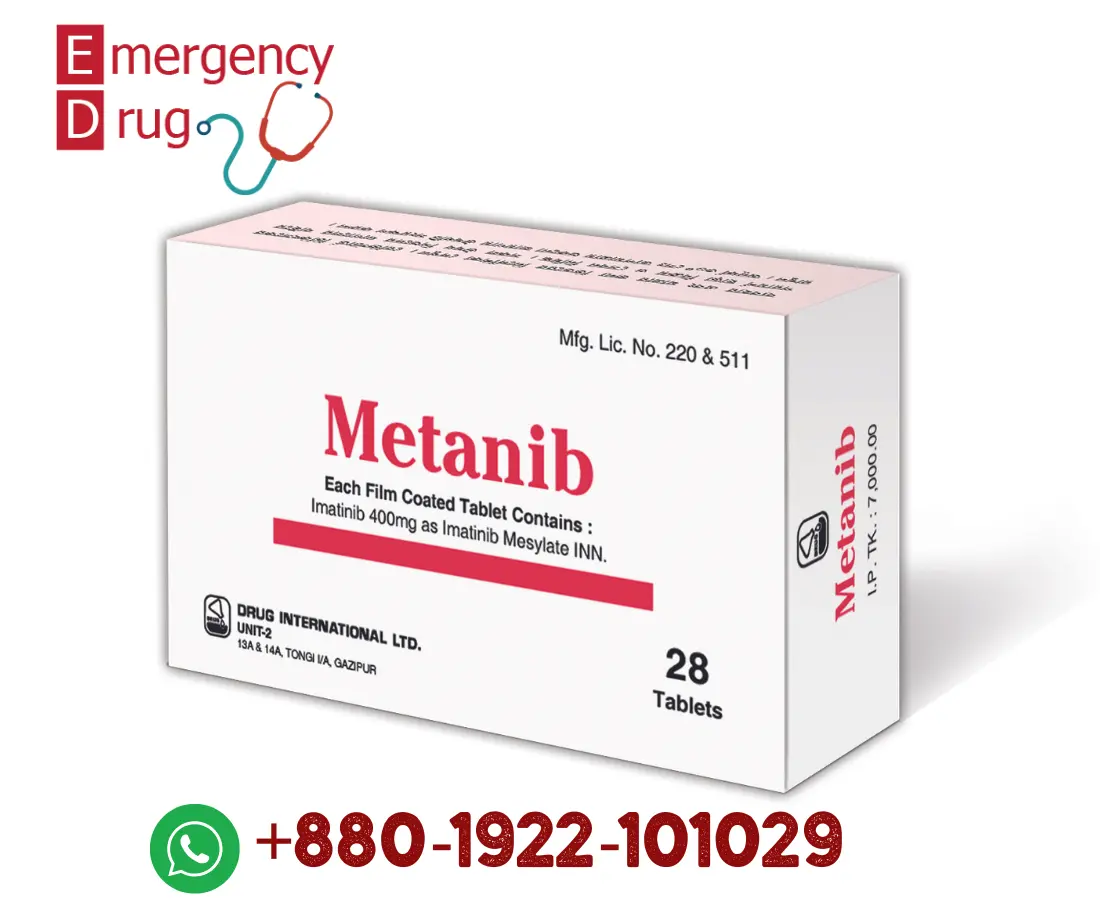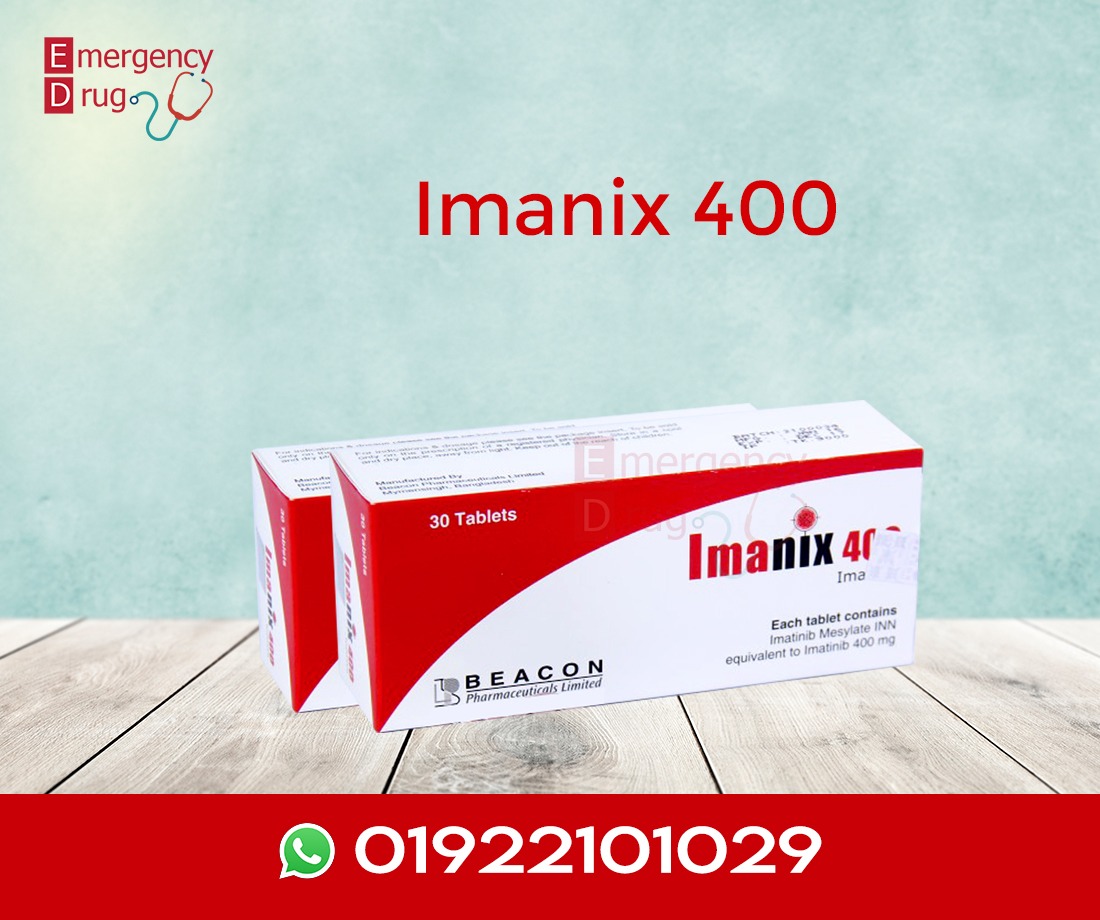Description
Each film coated tablet contains Metanib 400 mg as Imatinib Mesylate INN.
Product Features
| Product Name | : | Metanib |
| Generic Name | : | Imatinib |
| Formulation | : | Tablet |
| Available Pack Size | : | 28’s Pot |
| Available Strength | : | 400 mg |
| Registrations | : | Export Only |
Indications of Metanib
Newly Diagnosed Philadelphia Positive Chronic Myeloid Leukemia (Ph+ CML): Metanib is indicated for the treatment of newly diagnosed adult and pediatric patients with Philadelphia chromosome positive chronic myeloid leukemia (Ph+ CML) in chronic phase.
Ph+ CML in Blast Crisis (BC), Accelerated Phase (AP) or Chronic Phase (CP) after Interferon-alpha (IFN) Therapy: Metanib is indicated for the treatment of patients with Philadelphia chromosome positive chronic myeloid leukemia in blast crisis, accelerated phase, or in chro nic phase after failure of interferon-alpha therapy.
Adult Patients with Ph+ Acute Lymphoblastic Leukemia (ALL): Metanib is indicated for the treatment of adult patients with relapsed or refractory Philadelphia chromosome positive acute lymphoblastic leukemia (Ph+ ALL).
Pediatric Patients with Ph+ Acute Lymphoblastic Leukemia (ALL): Metanib is indicated for the treatment of pediatric patients with newly diagnosed Philadelphia chromosome positive acute lymphoblastic leukemia (Ph+ ALL) in combination with chemotherapy.
Myelodysplastic/Myeloproliferative Diseases (MDS/MPD): Metanib is indicated for the treatment of adult patients with myelodysplastic/myeloproliferative diseases associated with PDGFR (platelet-derived growth factor receptor) gene re-arrangements as determined with an FDA-approv ed test.
Aggressive Systemic Mastocytosis (ASM): Metanib is indicated for the treatment of adult patients with aggressive systemic mastocytosis without the D816V c-Kit mutati on as determined with an FDA-approved test.
Hypereosinophilic Syndrome (HES) and/or Chronic Eosinophilic Leukemia (CEL): Metanib is indicated for the treatment of adult patients with hypereosinophilic syndrome and/or chronic eosinophilic leukemia who have the FIP1L1-PDGFR a fusion kinase (mutational analysis or FISH demonstration of CHIC2 allele deletion) and for patients with HES and/or CEL who are FIP1L1-PDGFR a fusion kinase negative or unknown.
Dermatofibrosarcoma Protuberans (DFSP): Metanib is indicated for the treatment of adult patients with unresectable, recurrent and/or metastatic dermatofibrosarcoma pr otuberans.
Kit+ Gastrointestinal Stromal Tumors (GIST): Metanib is indicated for the treatment of patients with Kit (CD117) positive unresectable and/or metastatic malignant gastrointestinal stromal tumors.
Adjuvant Treatment of GIST: Metanib is indicated for the adjuvant treatment of adult patients following complete gross resection of Kit (CD117) positive GIST.
Dosage and Administration
The prescribed dose should be administered orally, with a meal and a large glass of water. Doses of 400 mg or 600 mg should be administered once daily, whereas a dose of 800 mg should be administered as 400 mg twice a day. For patients unable to swallow the film-coated tablets, the tablets may be dispersed in a glass of water or apple juice. The required number of tablets should be placed in the appropriate volume of beverage (approximately 50 ml for a 100 mg tablet, and 200 ml for a 400 mg tablet) and stirred with a spoon. The suspension should be administered immediately after complete disintegration of the tablet(s). For daily dosing of 800 mg and above, dosing should be accomplished using the 400 mg tablet to reduce exposure to iron. Treatment may be continued as long as there is no evidence of progressive disease or unacceptable toxicity.
Adult Patients with Ph+ CML CP, AP, or BC: The recommended dose of Metanib is 400 mg/day for adult patients in chronic phase CML and 600 mg/day for adult patients in accelerated phase or blast crisis. In CML, a dose increase from 400 mg to 600 mg in adult patients with chronic phase disease, or from 600 mg to 800 mg (given as 400 mg twice daily) in adult patients in accelerated phase or blast crisis may be considered in the absence of severe adverse drug reaction and severe non-leukemia related neutropenia or thrombocytopenia in the following circumstances: disease progression (at any time), failure to achieve a satisfactory hematologic response after at least 3 months of treatment, failure to achieve a cytogenetic response after 6 to 12 months of treatment, or loss of a previously achieved hematologic or cyto genetic response.
Pediatric Patients with Ph+ CML CP: The recommended dose of Metanib for children with newly diagnosed Ph+ CML is 340 mg/m2/day (not to exceed 600 mg). Metanib treatment can be given as a once daily dose or the daily dose may be split into two–one portion dosed in the morning and one portion in the evening. There is no experience with Metanib treatment in children under 1 year of age.
Adult Patients with Ph+ ALL: The recommended dose of Metanib is 600 mg/day for adult patients with relapsed/refractory Ph+ ALL.
Pediatric Patients with Ph+ ALL: The recommended dose of Metanib to be given in combination with chemotherapy to children with newly diagnosed Ph+ ALL is 340 mg/m2/day (not to exceed 600 mg). Metanib treatment can be given as a once daily dose.
Adult Patients with MDS/MPD: The recommended dose of Metanib is 400 mg/day for adult patients with MDS/MPD.
Adult Patients with ASM: The recommended dose of Metanib is 400 mg/day for adult patients with ASM without the D816V c-Kit mutation. For patients with ASM associated with eosinophilia, a clonal hematological disease related to the fusion kinase FIP1L1- PDGFR a, a starting dose of 100 mg/day is recommended. Dose increase from 100 mg to 400 mg for these patients may be considered in the absence of adverse drug reactions if assessments demonstrate an insufficient response to therapy.
Adult Patients with HES/CEL: The recommended dose of Metanib is 400 mg/day for adult patients with HES/CEL. For HES/CEL patients with demonstrated FIP1L1-PDGFR a fusion kinase, a starting dose of 100 mg/day is recommended.
Adult Patients with DFSP: The recommended dose of Metanib is 800 mg/day for adult patien ts with DFSP.
Adult Patients with Metastatic and/or Unresectable GIST: The recommended dose of Metanib is 400 mg/day for adult patients with unresectable and/or metastatic, malignant GIST. A dose increase up to 800 mg daily (given as 400 mg twice daily) may be considered, in patients showing clear signs or symptoms of disease progression at a lower dose and in the absence of severe advers e drug reactions.
Adult Patients with Adjuvant GIST: The recommended dose of Metanib is 400 mg/day for the adjuvant treatment of adult patients following complete gross resection of GIST. Or, as directed by the registered physicians.
Side Effects of Metanib
• Fluid Retention and Edema
• Hematologic Toxicity
• Congestive Heart Failure and Left Ventricular Dysfunction
• Hepatotoxicity
• Hemorrhage
• Gastrointestinal Disorders
• Hypereosinophilic Cardiac Toxicity
• Dermatologic Toxicities
• Hypothyroidism
• Growth Retardation in Children and Adolescents
• Tumor Lysis Syndrome
• Impairments Related to Driving and Using Machinery
• Renal Toxicity
Contraindication: It is contraindicated in patients with hypersensitivity to Imatinib or any other components of this product.
Use in Pregnancy and Lactation
Pregnancy category D. It can cause fetal harm when administered to a pregnant woman. Women should be advised to avoid pregnancy when taking Metanib. If this drug is used during pregnancy, or if the patient becomes pregnant while taking this drug, the patient should be apprised of the potential hazard to the fetus.
Lactation: Imatinib and its active metabolite are excreted into human milk. Because of the potential for serious adverse reactions in breastfed infants from Metanib, a lactating woman should be advised not to breastfeed during treatment and for 1 month after the last dose.
Contraception
Females: Female patients of reproductive potential should be advised to use effective contraception when using Metanib during treatment and for fourteen days after stopping treatment with Metanib.
Pediatric Use: The safety and effectiveness of Metanib have been demonstrated in pediatric patients with newly diagnosed Ph+ chronic phase CML and Ph+ ALL.
Overdose
Adult Overdose: 1,200 to 1,600 mg (duration varying between 1 to 10 days): Nausea, vomiting, diarrhea, rash erythema, edema, swelling, fatigue, muscle spasms, thrombocytopenia, pancytopenia, abdominal pain, headache, decreased appetite. 1,800 to 3,200 mg (as high as 3,200 mg daily for 6 days): Weakness, myalgia, increased CPK, increased bilirubin, gastrointestinal pain. 6,400 mg (single dose): One case in the literature reported one patient who experienced nausea, vomiting, abdominal pain, pyrexia, facial swelling, neutrophil count decreased, increase transaminases. 8 to 10 g (single dose): Vomiting and gastrointestinal pain have been reported.
Pediatric Overdose: One 3-year-old male exposed to a single dose of 400 mg experienced vomiting, diarrhea and anorexia and another 3-year-old male exposed to a single dose of 980 mg experienced decreased white blood cell count and diarrhea.
Storage
Store below 30o C in a cool and dry place, away from sunlight. Keep out of reach of children.
For more Medicine, Visit Our Shop





Reviews
There are no reviews yet.